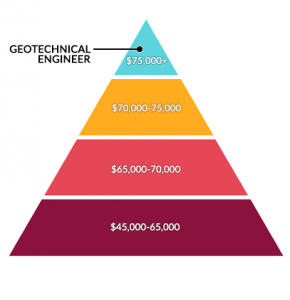Excitement About Geotheta
Wiki Article
Some Of Geotheta
Table of Contents10 Easy Facts About Geotheta ExplainedGeotheta Can Be Fun For EveryoneThe Best Guide To GeothetaNot known Details About Geotheta Examine This Report about Geotheta

They perform website examinations, collect examples, do laboratory tests, and examine data to examine the suitability of the ground for building and construction tasks - Tailings Engineer. Based on their findings, geotechnical designers offer recommendations for foundation style, incline security, preserving frameworks, and reduction of geotechnical threats. They work together with other professionals, such as engineers, architectural engineers, and building groups, to make certain that geotechnical considerations are incorporated into the total project design and implementation
By assessing the behavior and homes of soil and rock, they can determine possible geotechnical threats such as landslides, dirt negotiation, or slope instability. Their experience aids stop failures or crashes that can threaten lives and property. Here are some in-depth obligations and responsibilities of a geotechnical engineer: Website Examination: Geotechnical designers conduct site examinations to collect information on subsurface conditions.
They translate the information to comprehend the buildings and actions of the soil and rock, including their strength, leaks in the structure, compaction attributes, and groundwater problems. Geotechnical Evaluation and Style: Geotechnical designers examine the data accumulated throughout website investigations to examine the stability and viability of the website for building and construction projects. They execute geotechnical computations and modeling to examine variables such as bearing capacity, settlement, slope security, side earth pressures, and groundwater flow.
All About Geotheta
Foundation Design: Geotechnical designers play a crucial function in creating foundations that can safely sustain the desired framework. They analyze the soil problems and load demands to establish the appropriate foundation type, such as superficial structures (e.g., footings), deep foundations (e.g (https://www.pageorama.com/?p=geotheta)., piles), or specialized methods like soil improvement. They consider factors such as negotiation limits, birthing capability, and soil-structure interaction to establish optimal structure stylesThey review construction strategies, monitor website activities, and conduct field assessments to validate that the layout referrals are adhered to. If unpredicted geotechnical concerns occur, they assess the circumstance and offer referrals for remediation or changes to the style. Risk Evaluation and Reduction: Geotechnical engineers assess geotechnical dangers and dangers connected with the task website, such as landslides, liquefaction, or soil erosion.

Cooperation and Interaction: Geotechnical engineers function very closely with other specialists involved in a task, such as engineers, architectural designers, and construction teams. Reliable interaction and collaboration are necessary to integrate geotechnical considerations right into the total job style and building procedure. Geotechnical engineers supply technical experience, answer queries, and guarantee that geotechnical demands are satisfied.
Not known Facts About Geotheta
Here are some kinds of geotechnical designers: Structure Engineer: Foundation designers focus on making and assessing structures for structures. They evaluate the dirt conditions, lots demands, and website characteristics to identify the most proper foundation kind and layout, such as shallow foundations, deep foundations, or specialized techniques like stack foundations.They review the variables influencing incline security, such as soil buildings, groundwater problems, and slope geometry, and create approaches to stop incline failings and minimize risks. Quake Designer: Quake engineers specialize in analyzing and making structures to endure seismic pressures. They examine the seismic threat of a site, assess dirt liquefaction capacity, and establish seismic layout standards to guarantee the safety and security and strength of structures during quakes.
They do field testing, collect samples, and evaluate the gathered data to identify the soil residential or commercial properties, geologic developments, and groundwater problems at a site. Geotechnical Instrumentation Designer: Geotechnical instrumentation designers focus on monitoring and measuring the behavior of soil, rock, and frameworks. They install and keep instrumentation systems that keep track of variables such as soil settlement, groundwater degrees, slope movements, and architectural displacements to assess efficiency and offer early cautions of prospective problems.
Geotheta - Truths
They conduct tests such as triaxial examinations, combination examinations, direct shear examinations, and leaks in the structure tests to collect data for geotechnical evaluation and style. Geosynthetics Designer: Geosynthetics engineers concentrate on the design and application of geosynthetic products, such as geotextiles, geogrids, and geomembranes. They make use of these products to boost soil article source stability, reinforce slopes, offer water drainage options, and control erosion.They have a tendency to be investigative people, which implies they're intellectual, reflective, and investigative. They wonder, systematic, sensible, logical, and logical. A few of them are also social, suggesting they're kind, charitable, participating, client, caring, valuable, understanding, skillful, and pleasant. Does this audio like you? Take our cost-free job test to discover if geotechnical designer is just one of your leading career suits.
In the office setting, geotechnical engineers use specialized software application tools to carry out computations, create designs, and assess data. They prepare records, evaluation project requirements, interact with clients and staff member, and coordinate project tasks. The office setting supplies a conducive setting for research study, analysis, and collaboration with various other experts entailed in the task.
Rumored Buzz on Geotheta
They often go to project sites to perform site examinations, evaluate geotechnical conditions, and gather information for analysis. These brows through entail taking a trip to different locations, occasionally in remote or tough terrains. Geotechnical engineers may do soil sampling, conduct tests, and display building tasks to guarantee that the geotechnical elements of the job are being applied properly.Geotechnical designers additionally operate in specialized geotechnical laboratories. In these facilities, they conduct experiments, carry out tests on soil and rock examples, and examine the design homes of the products. Geotechnical laboratory engineers function thoroughly in these settings, dealing with testing devices, running instruments, and recording data. They collaborate with other laboratory personnel to make sure precise and trusted screening outcomes.
Report this wiki page